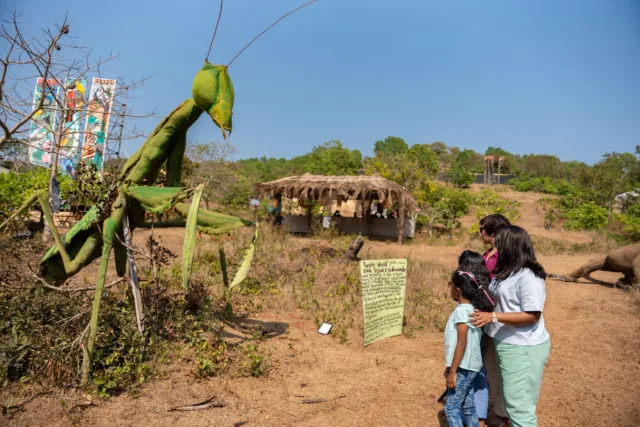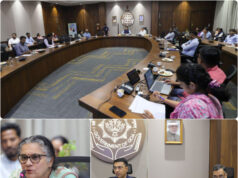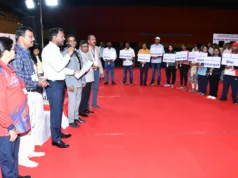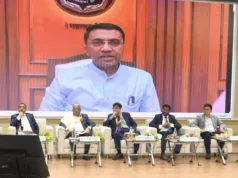Echoes of Earth, India’s greenest festival, recently concluded its debut edition in Goa, presenting a rich amalgamation of art, culture, music, and sustainability. The festival was dedicated to spreading awareness about Goa’s rich biodiversity and the Western Ghats.
The festival actively contributed to responsible ecotourism by partnering with local eco-warriors and grassroots-level communities. Collaborating with partners such as the Goa Tourism, Goa State Biodiversity Board, WWF-India, and Reef Watch Conservation, it aimed to celebrate and aid in efforts to preserve the biodiversity of Goa and Western Ghats. This was underscored by its conceptual theme in Goa, ‘Ensemble of the Wild.’
A festival for all ages, from toddlers to the elderly, Echoes of Earth aims to instil a sense of responsibility towards the environment and conserve it. The festival’s Goa edition saw a cumulative footfall of over 10,000 attendees over its three-day duration.
“By embracing principles of circular design, the art and stages were crafted from old, discarded and repurposed junk sourced from prior editions, exemplifying a commitment to sustainability. The festival’s Goa edition sustainability report will be released in the coming days,” said Roshan Netalkar, festival director and founder, Echoes of Earth.
Suneel Anchipaka (IAS), Director of Tourism, Goa, stated that festivals like Echoes of Earth which adhere to the Goa Tourism Development Corporation’s (GTDC) masterplan of highlighting regenerative tourism in the state ought to be promoted.
“Goa is the first state in India to launch a Regenerative Tourism Model. This form of tourism goes beyond sustainability – the GTDC’s master plan emphasises responsible tourism and regenerative tourism. Under the latter’s framework, the Goa Tourism Department has been promoting several initiatives like Echoes of Earth, as the festival uses sustainable material for its infrastructural design and decor and children and adults are educated about Goa’s forests and marine ecosystem,” Anchipaka said.
Anchipaka stated that there are plans to make the festival an annual affair in Goa’s event calendar as it is an amalgamation of celebration and awareness for children and adults to partake in, hence it appeals to all sections of people.
This edition of Echoes of Earth featured over 20-plus installations highlighting a variety of Goa’s fauna crafted from scrap metal, recycled plastic, old tyres, crowd-sourced e-waste, and other upcycled materials.
Talented art artists contributed to the creation of these installations. Akshay Manjrekar crafted the Tailless Whip Scorpion and Malabar Tree Nymph butterfly, Nirmal Kulkarni crafted the Yellow Lipped Sea Krait, Yadhunandan crafted the Praying Mantis and Olive Ridley Turtles, and AltNative designed the Indian Gaur, among others, which were installed across the festival site.
Uniquely crafted stages such as ‘The Kraken’, ‘The Big Beak’, and ‘The Ghost’, honouring the Giant Pacific Octopus, the Great Indian Hornbill and the Horned Ghost Crab, respectively, were standout features of the festival. Created from a combination of junk, scrap, bamboo, and state-of-the-art technology, these stages were conceptualized by festival director Roshan Netalkar and executed by artists Siddhartha Kararwal and Muzamil Shairff.
The festival featured over 40-plus local musical acts from Goa, India, and abroad, who performed across the four stages, serenading attendees with tunes spanning a variety of music genres. Attendees grooved to performances by international artists such as Satori, Glass Beams, Oden & Fatzo, ((( O ))) of Sundrop Garden, and more.
Additionally, Indian and Goan artists like Leaxan Freitas, Merak, Elvis Lobo, Dualist Inquiry, Discokid, Vairaagi, Shantam, and Steffan contributed to the festival. Many of these artists are deeply rooted in Goa’s music culture, contributing to its vibrant heritage.
In its pursuit to become a carbon-neutral, zero-waste festival, Echoes of Earth collaborated with partners like BLive, facilitating e-bikes and e-rickshaws for the local commute of artists and employees, thereby reducing the carbon footprint. Additionally, the implementation of free RO water filters and initiatives like introducing reusable steel glasses helped in eliminating single-use plastic bottles, ensuring there is no landfill. Moreover, festival communications on-site were emphasized through creatively done hand-painted wooden and cardboard signage, encouraging greener practices.
On the waste management front, stringent measures were implemented to efficiently dispose of waste generated onsite. Hasiru Dala Innovations, the festival’s sustainability partner since 2016, ensured that the waste was segregated at designated waste disposal zones. The festival has commissioned a longer and more in-depth report on the sustainability footprint, which will be released to the public soon. This report will contribute key insights to understanding how large-format festivals can and should be conceptualized while prioritizing preservation and responsible celebration at their core.
The festival also featured locally curated culinary experiences, children’s workshops led by educational experts, and knowledge-sharing activities at the Greener Side zone. Additionally, there was a curated flea market showcasing sustainable brands offering organic and artisanal products, among many other offerings.
“We are thrilled that our maiden edition of Echoes of Earth music festival in Goa has been a huge success. Goa, which is home to rich ecosystems and biodiversity and a culture of international music and entertainment, was the perfect destination for us to test the potential of the philosophy behind Echoes of Earth. Additionally, the festival will reinforce its commitment to sustainability by implementing a plantation drive with every ticket sold at the Goa festival site. This initiative is designed to foster environmental preservation and restoration, aligning with our mission to promote a greener future,” said Netalkar.
Netalkar further expressed, “We maintained our signature ‘vibe’ of being an inclusive and multi-sensorial experience – with over 10,000 people attending to enjoy the art, installations, and music responsibly with their kids, pets, and families. We successfully delivered on our vision of bringing India’s most sustainable festival to Goa, thanks to the incredible support from our community and partners. This success has prompted us to aspire to make the festival bigger and more sustainable in 2025.’’






